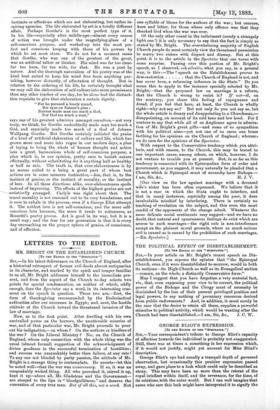LETTERS TO THE EDITOR.
MR. BRIGHT ON THE ESTABLISHED CHURCH.
[TO THE EDITOR OF THE " SPECTATOR:]
SIR,—In his latest deliverance on the Church of England, after a. historical retrospect of former evil deeds almost antiquarian in its character, and marked by the spirit and temper familiar to us all, Mr. Bright addresses himself to the immediate pre- sent, and from the aspect of the Church to-day selects two points for special condemnation, on neither of which, oddly enough, does the Spectator say a word, in its interesting com- ment on the speech in question. These two are,—first, the form of thanksgiving recommended by the Ecclesiastical authorities after our successes in Egypt ; and, next, the hostile attitude of the Church toward the threatened invasion of the law of marriage.
Now, as to the first point. After dwelling with his own unrivalled power on the horrors, the unutterable miseries of war, and of that particular war, Mr. Bright proceeds to pour out his indignation,—on whom On the authors or kindlers of the war ? On the Liberal Ministry ? No; on the Church of England, whose only connection with the whole thing was the usual (almost formal) suggestion of the acknowledgment of divine goodness in the successful termination of hostilities ; and success was unspeakably better than failure, at any rate ! To any one not blinded by party passion, the attitude of Mr. Bright is a strange thing to contemplate. He asserts—let this be noted well—that the war was unnecessary. If so, it was an unspeakably wicked thing. All who provoked it, stirred it up, kept it up—above all, Mr. Gladstone and the Government— are steeped to the lips in " bloodgniltiness," and deserve the execration of every true man. But of all this, not a word. Not
one syllable of blame for the authors of the war ; but censure, keen and bitter, for those whose only offence was that they thanked God when the war was over.
Of the only other count in the indictment (surely a strangely light one !) it is only necessary to say that the fact is simply as stated by Mr. Bright. The overwhelming majority of English Church people do most certainly view the threatened permission to marry two sisters with disgust and dismay. But at this point it is to the article in the Spectator that one turns with some surprise. Passing over this portion of Mr. Bright's speech, as I observed, sub silentio, what you say, in a general way, is this :—The "speech on the Establishment proves to dem on stration that the Church of England is not, and has never been, a reforming influence in the State." Do you mean this to apply to the instance specially selected by Mr. Bright,—that the proposed law on marriage .is a reform, that the Church is wrong to resist it P If not—if, on the contrary, you share this feeling of repugnance and. dread, if you feel that here, at least, the Church is wholly right—why not say so But not only do you not say so, but the whole article is dreary and disappointing to a Churchman,— disappointing, on account of its cold tone and low level. For I venture to say that while all of us Anglicans agree in admira- tion of Mr. Bright's great gifts—and some of us sympathise with his political aims—yet not one of us cares one brass farthing for his opinions on the Church of England ; whereas, we do care for the opinions of the Spectator.
With respect to the Conservative tendency which you attri- bute, and with reason, to the Church, this may be traced to one important cause, among others, on which, however, I do not venture to trouble you at present. But, in so far as this tendency is connected with its Episcopalian form of order and government, as you suggest, it may naturally be pleaded that a Church which is Episcopal must of necessity have Bishops.—
[Our view on the law against marriage with a deceased wife's sister has been often expressed. We believe that it is not a case in which the State ought to interfere, and. that in mani, instances, espdcially among the poor, it does incalculable mischief by interfering. There is certainly no teaching of revelation on the subject, and this even the most candid of the opponents of the change admit. Whatever the more delicate social sentiments may suggest—and we have no doubt that natural and spontaneous feelings do exist which are averse to such marriages—the right rule is non-interference except on the plainest moral grounds, where so much serious evil is caused as is caused by the prohibition of such marriages. :—En. Spectator.]


































 Previous page
Previous page